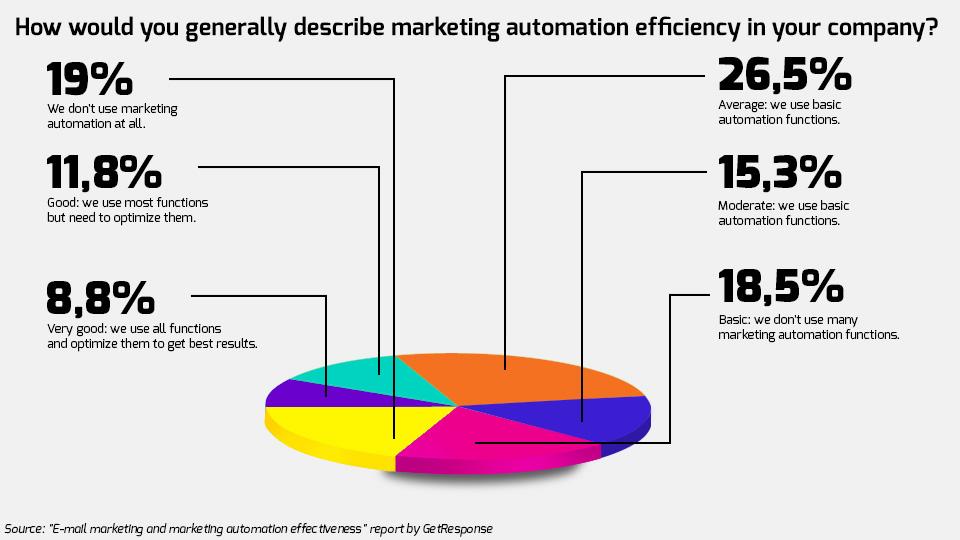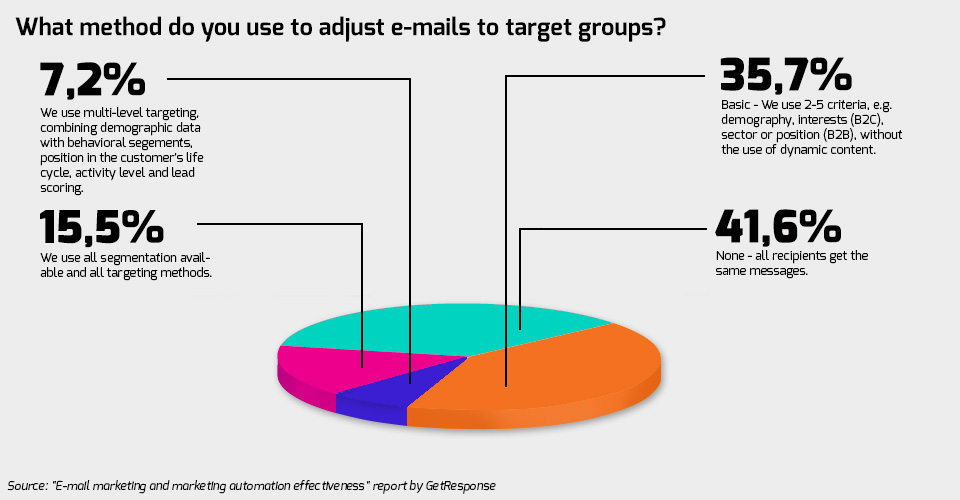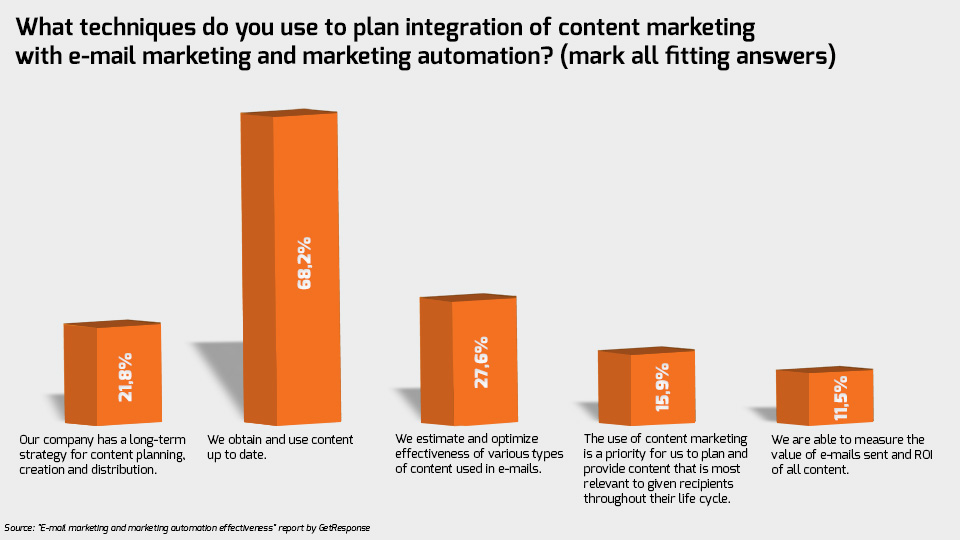
Compellingly engaged and creatively charming, with ease she’ll stir to action and skillfully lead any customer, graphic designer or other representative of maleness charmed by her creative nature. With inborn empathy she can look at tasks from customers’ perspective.
Tagi: newsletter, e-mail marketing, B2B communication, B2C communication, targeting, B2E communication, marketing automation
An e-mail – you could say an archaic tool, a dinosaur in today’s communication. In comparison to modern intuitive social media it looks rather bland. Is it doomed to extinction? Does e-mail marketing still pay back? To answer these questions, let’s take a look at numbers. And they say that currently nearly 97% of Internet users has at least one e-mail account, and nearly 70% looks up their boxes at least once a day. It’s been estimated by the end of 2019 the number of e-mail users will go beyond 1/3rd of the human population (over 2.9 billion people). Considering the data, no one can deny there is a huge potential in e-mail. Experts also seem to agree. “Despite the gloomy visions projecting the end of this form of communication, the number of e-mail users continues to grow. Along with the expansion of the social media and applications that enable you to send messages in real time, the original role of e-mail as a medium for communicating with friends and family has decreased. At the same time, e-mails were gaining importance in business – it has become the preferred way to exchange information between companies and their clients or customers,” says Michał Leszczyński, Content Marketing Manager at GetResponse.
In order to take a closer look at the effect of e-mail marketing, GetResponse took a survey among 2,800 marketers from 127 countries. The result? E-mail marketing is still the most effective online communication channel. Every second participant of the survey sees it as a “good” or “great” communication tool, and 42% of Polish marketers declare to increase expenditure on e-mail marketing in 2017.
What else can we learn from the survey?
Marketing automation enables you to make communication more consistent, to manage campaigns and measure the effects. It allows you to provide content in various moments of the customer’s life cycle, thus shifting them downwards in the sales pipeline.
According to the survey, 19% of companies in Poland do not use any type of marketing automation, 60% use it only on the average or lower level, and 21% uses automation on a good or very good level. For comparison, in a global study 17% of companies admitted not to use this solution, 54% estimated their level to be average or lower, and 27.5% said the level of automation in their companies is on a good or very good level.
As you can see, marketers are rather careful when it comes to marketing automation, although they are gradually gaining more confidence in the tool.What’s interesting, the biggest problem with automation for Polish respondents is the quality of customer data (38.6%) and creating attractive content (37.1%), while for their colleagues abroad the biggest barrier is obtaining the right budget (36%). If you happen to be part of the group having trouble creating engaging content, we encourage you to take a look at the opinion of this year’s Content Marketing World speakers on developing quality content.

Marketers tend to complain about the amount of data available: not necessarily that there’s not enough, but that there’s too much of it. Too much poor quality information makes it more difficult to analyse the data and to take the right business decisions. The process of creating engaging content is closely related to this problem. (…) Marketers should first define what information about the recipients they really need and how they are going to get it. Then you need to synchronise all the used tools to make the customer base always complete and updated. When you know the actual profile of your recipients, it’s much easier to create engaging content, test it and analyse it.
Michał Leszczyński, Content Marketing Manager, GetResponse
Every day Internet users get so much spam and if we don’t make content respond to their needs, we’re going to sink in the sea of e-mails that are irrelevant for them. Sending the right message to the right people makes an effective campaign, and targeting enables you to personalise and segment content.
According to the study, 58.4% of Polish respondents use message personalisation and segmentation. Only 15.5% of them use full segmentation and all the targeting methods, but it’s a good result, considering it’s not always possible to have segmentation and personalisation based on more than 5 criteria. When compared with global results, Polish marketers look far better, as less than 50% of the respondents abroad use targeting.

Marketers continue to see e-mail marketing campaigns as a possibility to send content to all subscribers in their database, and not an opportunity to get in touch individually with the subscribers. Most of them use e-mailing as an advertising channel and pay more attention to quantity than to quality. In order for e-mail marketing to be effective, brands must see e-mail communication strategy as a priority. The goal is to create the best possible experience for the customer already on the level of their e-mail box – one that will generate the highest return on investment.
Philip Storey, founder of Enchant, CRM advising company
Content is one of the basic elements of incoming marketing. When defining marketing activities, it’s worth thinking about a long-term content planning strategy, because this way you can create a coherent image of your company and engage your audience more.
But according to research, more than 2/3rd of the Polish respondents (68%) do not have a long-term strategy for their content marketing vision and obtain content up to date. Only one in five respondents claims the company they work for has a long-term content planning, creation and distribution strategy.

Content planning strategy and its implementation is a big challenge. But the lack of a long-term strategy can only increase the chaotic nature of this dynamic creative process, and surely it doesn’t help create valuable content for building business. Although many people do not find such a strategy necessary, I believe it to be a crucial element of successful content marketing. Without a strategy only a coincidence can make your content bring real business profits.
Urszula Radzińska, president AUDE, member of International Content Marketing Forum
If you want to learn more details, we encourage you to read the full version of the report “E-mail marketing and marketing automation effectiveness 2017.”
Kategorie: top trends, school of contentic, B2E, B2C, B2B
Kategorie: top trends, school of contentic, B2E, B2C, B2B
Tagi: newsletter, e-mail marketing, B2B communication, B2C communication, targeting, B2E communication, marketing automation
